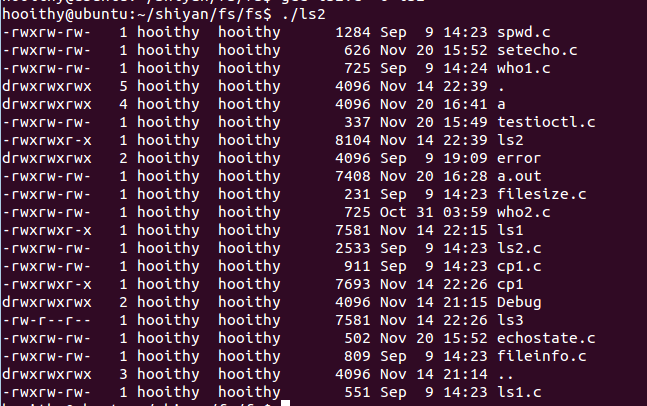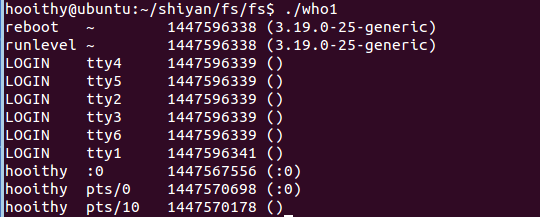20135323符运锦--信息安全系统设计基础第十周学习总结
学习计时:共8小时
读书:1
代码:5
作业:0
博客:2
学习要求
代码阅读理解:
- 编译运行代码
- 使用man学习理解相关系统调用, 理解参数、返回值的含义
- 会用grep -nr xxx /usr/include 查宏定义
cp1.c
echostate.c
fileinfo.c
filesize.c
ls1.c
ls2.c
setecho.c
spwd.c
testioctl.c
who1.c
who2.c
学习内容
1.cp
#include <stdio.h>
#include <stdlib.h>
#include <unistd.h>
#include <fcntl.h>//宏和open
define BUFFERSIZE 4096//存储器容量
#define COPYMODE 0644//复制长度
void oops(char *, char *);
int main(int argc, char *argv[])
{
int in_fd, out_fd, n_chars;//三个描述符值
char buf[BUFFERSIZE];
if (argc != 3) {
fprintf(stderr, "usage: %s source destination\n", *argv);
exit(1);
}
/*检查cp的第一个参数,要复制的文件,用open打开,in_fd为open返回的描述符*/
if ((in_fd = open(argv[1], O_RDONLY)) == -1)
oops("Cannot open ", argv[1]);
/*检查cp的第二个参数,复制的目的地址,用create在目的地址创建新文件,out_fd为open返回的描述符*/
if ((out_fd = creat(argv[2], COPYMODE)) == -1)
oops("Cannot creat", argv[2]);
/*cp指令的动作就是读取一个文件的内容到存储器,在新的地址创建空白文件,再从存储器将内容写入新文件。*/
while ((n_chars = read(in_fd, buf, BUFFERSIZE)) > 0)
if (write(out_fd, buf, n_chars) != n_chars)
oops("Write error to ", argv[2]);
if (n_chars == -1)
oops("Read error from ", argv[1]);
if (close(in_fd) == -1 || close(out_fd) == -1)
oops("Error closing files", "");
}
/*这个是用来输出错误信息的函数*/
void oops(char *s1, char *s2)
{
fprintf(stderr, "Error: %s ", s1);
perror(s2);
(stderr)
exit(1);
}
实现过程:1.开启源文件
2.创建目标文件
3.将源文件读入缓冲区
4.将缓冲区内容写入目标文件
5.关闭

2.ls1\ls2
1.ls -l 以长格式的形式查看当前目录下所有可见文件的详细属性
2.ls -a 列出的内容包含以“.”开头的文件
3.ls -lu 最后访问时间
4.ls -s 以块为单位的文件大小
5.ls -t 按时间排序
6.ls -F 显示文件类型
#include <stdio.h>
#include <sys/types.h>
#include <dirent.h>
void do_ls(char []);
int main(int argc, char *argv[])
{
if ( argc == 1 )
do_ls( "." );
else
while ( --argc ){
printf("%s:\n", *++argv );
do_ls( *argv );
}
return 0;
}
void do_ls( char dirname[] )
{
DIR *dir_ptr;
struct dirent *direntp;
if ( ( dir_ptr = opendir( dirname ) ) == NULL )
fprintf(stderr,"ls1: cannot open %s\n", dirname);
else
{
while ( ( direntp = readdir( dir_ptr ) ) != NULL )
printf("%s\n", direntp->d_name );
closedir(dir_ptr);
}
}
此函数用来显示文件的详细信息:用户名,群组名,大小,创建时间,读写执行权


#include <stdio.h>
#include <string.h>
#include <sys/types.h>
#include <dirent.h>
#include <sys/stat.h>
void do_ls(char[]);
void dostat(char *);
void show_file_info( char *, struct stat *);
void mode_to_letters( int , char [] );
char *uid_to_name( uid_t );
char *gid_to_name( gid_t );
int main(int argc, char *argv[])
{
if ( argc == 1 )
do_ls( "." );
else
while ( --argc ){
printf("%s:\n", *++argv );
do_ls( *argv );
}
return 0;
}
void do_ls( char dirname[] )
{
DIR *dir_ptr;
struct dirent *direntp;
if ( ( dir_ptr = opendir( dirname ) ) == NULL )
fprintf(stderr,"ls1: cannot open %s\n", dirname);
else
{
while ( ( direntp = readdir( dir_ptr ) ) != NULL )
dostat( direntp->d_name );
closedir(dir_ptr);
}
}
void dostat( char *filename )
{
struct stat info;
if ( stat(filename, &info) == -1 )
perror( filename );
else
show_file_info( filename, &info );
}
void show_file_info( char *filename, struct stat *info_p )
{
char *uid_to_name(), *ctime(), *gid_to_name(), *filemode();
void mode_to_letters();
char modestr[11];
mode_to_letters( info_p->st_mode, modestr );
printf( "%s" , modestr );
printf( "%4d " , (int) info_p->st_nlink);
printf( "%-8s " , uid_to_name(info_p->st_uid) );
printf( "%-8s " , gid_to_name(info_p->st_gid) );
printf( "%8ld " , (long)info_p->st_size);
printf( "%.12s ", 4+ctime(&info_p->st_mtime));
printf( "%s\n" , filename );
}
void mode_to_letters( int mode, char str[] )
{
strcpy( str, "----------" );
if ( S_ISDIR(mode) ) str[0] = 'd';
if ( S_ISCHR(mode) ) str[0] = 'c';
if ( S_ISBLK(mode) ) str[0] = 'b';
if ( mode & S_IRUSR ) str[1] = 'r';
if ( mode & S_IWUSR ) str[2] = 'w';
if ( mode & S_IXUSR ) str[3] = 'x';
if ( mode & S_IRGRP ) str[4] = 'r';
if ( mode & S_IWGRP ) str[5] = 'w';
if ( mode & S_IXGRP ) str[6] = 'x';
if ( mode & S_IROTH ) str[7] = 'r';
if ( mode & S_IWOTH ) str[8] = 'w';
if ( mode & S_IXOTH ) str[9] = 'x';
}
#include <pwd.h>
char *uid_to_name( uid_t uid )
{
struct passwd *getpwuid(), *pw_ptr;
static char numstr[10];
if ( ( pw_ptr = getpwuid( uid ) ) == NULL ){
sprintf(numstr,"%d", uid);
return numstr;
}
else
return pw_ptr->pw_name ;
}
#include <grp.h>
char *gid_to_name( gid_t gid )
{
struct group *getgrgid(), *grp_ptr;
static char numstr[10];
if ( ( grp_ptr = getgrgid(gid) ) == NULL ){
sprintf(numstr,"%d", gid);
return numstr;
}
else
return grp_ptr->gr_name;
}
ls2更加详细

3.echostate.c/setecho.c
#include <stdio.h>
#include <stdlib.h>
#include <termios.h>
int main()
{
struct termios info;
int rv;
rv = tcgetattr( 0, &info ); /* read values from driver */
if ( rv == -1 ){
perror( "tcgetattr");
exit(1);
}
if ( info.c_lflag & ECHO )
printf(" echo is on , since its bit is 1\n");
else
printf(" echo is OFF, since its bit is 0\n");
return 0;
}
echostate显示输入命令是否可见。其中:echo is on:命令可见;echo is off:命令不可见
#include <stdio.h>
#include <stdlib.h>
#include <termios.h>
#define oops(s,x) { perror(s); exit(x); }
int main(int argc, char *argv[])
{
struct termios info;
if ( argc == 1 )
exit(0);
if ( tcgetattr(0,&info) == -1 ) /* get attribs */
oops("tcgettattr", 1);
if ( argv[1][0] == 'y' )
info.c_lflag |= ECHO ; /* turn on bit */
else
info.c_lflag &= ~ECHO ; /* turn off bit */
if ( tcsetattr(0,TCSANOW,&info) == -1 ) /* set attribs */
oops("tcsetattr",2);
return 0;
}
setecho用来改变输入指令是否可见。其中:输入y(或是以y开头的一串字符),命令可见;否则(即输入不以y开头的字符),命令不可见

4.fileinfo.c/filesize.c
#include <stdio.h>
#include <sys/types.h>
#include <sys/stat.h>
void show_stat_info(char *, struct stat *);
int main(int argc, char *argv[])
{
struct stat info;
if (argc>1)
{
if( stat(argv[1], &info) != -1 ){
show_stat_info( argv[1], &info );
return 0;
}
else
perror(argv[1]);
}
return 1;
}
void show_stat_info(char *fname, struct stat *buf)
{
printf(" mode: %o\n", buf->st_mode);
printf(" links: %d\n", buf->st_nlink);
printf(" user: %d\n", buf->st_uid);
printf(" group: %d\n", buf->st_gid);
printf(" size: %d\n", (int)buf->st_size);
printf("modtime: %d\n", (int)buf->st_mtime);
printf(" name: %s\n", fname );
}
用来实现显示文件信息:
1.mode:st_mode//文件的类型和存取的权限
2.links:st_nlin//连到该文件的硬链接数目,刚建立的文件值为1
3.user:st_uid//用户ID
4.group:st_gid//组ID
5.size:st_size//文件字节数
6.modtime:st_mtime//最后一次修改时间
7.name: //输入的文件名
#include <stdio.h>
#include <sys/stat.h>
int main()
{
struct stat infobuf;
if ( stat( "/etc/passwd", &infobuf) == -1 )
perror("/etc/passwd");
else
printf(" The size of /etc/passwd is %d\n", infobuf.st_size );
}
用st_size计算文件的字节数大小

5.spwd.c
#include <stdio.h>
#include <stdlib.h>
#include <string.h>
#include <sys/types.h>
#include <sys/stat.h>
#include <dirent.h>
ino_t get_inode(char *);
void printpathto(ino_t);
void inum_to_name(ino_t , char *, int );
int main()
{
printpathto( get_inode( "." ) );
putchar('\n');
return 0;
}
void printpathto( ino_t this_inode )
{
ino_t my_inode ;
char its_name[BUFSIZ];
if ( get_inode("..") != this_inode )
{
chdir( ".." );
inum_to_name(this_inode,its_name,BUFSIZ);
my_inode = get_inode( "." );
printpathto( my_inode );
printf("/%s", its_name );
}
}
void inum_to_name(ino_t inode_to_find , char *namebuf, int buflen)
{
DIR *dir_ptr;
struct dirent *direntp;
dir_ptr = opendir( "." );
if ( dir_ptr == NULL ){
perror( "." );
exit(1);
}
while ( ( direntp = readdir( dir_ptr ) ) != NULL )
if ( direntp->d_ino == inode_to_find )
{
strncpy( namebuf, direntp->d_name, buflen);
namebuf[buflen-1] = '\0';
closedir( dir_ptr );
return;
}
fprintf(stderr, "error looking for inum %d\n", (int) inode_to_find);
exit(1);
}
ino_t get_inode( char *fname )
{
struct stat info;
if ( stat( fname , &info ) == -1 ){
fprintf(stderr, "Cannot stat ");
perror(fname);
exit(1);
}
return info.st_ino;
}
列出当前目录

6.testioctl.c
#include <stdio.h>
#include <stdlib.h>
#include <unistd.h>
#include <sys/ioctl.h>
int main()
{
struct winsize size;
if( isatty(STDOUT_FILENO) == 0)
exit(1);
if (ioctl(STDOUT_FILENO, TIOCGWINSZ, &size) < 0) {
perror("ioctl TIOCGWINSZ error");
exit(1);
}
printf("%d rows %d columns\n", size.ws_row, size.ws_col);
return 0;
}
获得终端设备的窗口大小

7.who
#include <stdio.h>
#include <stdlib.h>
#include <utmp.h>
#include <fcntl.h>
#include <unistd.h>
#define SHOWHOST
int show_info( struct utmp *utbufp )
{
printf("%-8.8s", utbufp->ut_name);
printf(" ");
printf("%-8.8s", utbufp->ut_line);
printf(" ");
printf("%10ld", utbufp->ut_time);
printf(" ");
#ifdef SHOWHOST
printf("(%s)", utbufp->ut_host);
#endif
printf("\n");
return 0;
}
int main()
{
struct utmp current_record;
int utmpfd;
int reclen = sizeof(current_record);
if ( (utmpfd = open(UTMP_FILE, O_RDONLY)) == -1 ){
perror( UTMP_FILE );
exit(1);
}
while ( read(utmpfd, ¤t_record, reclen) == reclen )
show_info(¤t_record);
close(utmpfd);
return 0;
}
打开utmp文件,针对文件,读取想要的信息到存储器中,再用标准输出函数打印到屏幕上,关闭文件


参考资料
《深入理解计算机系统》
ls.tar视频



